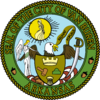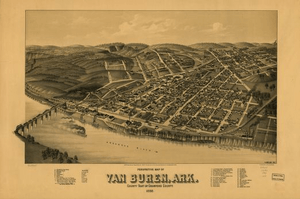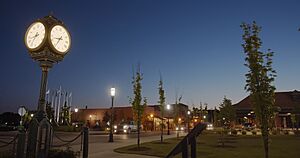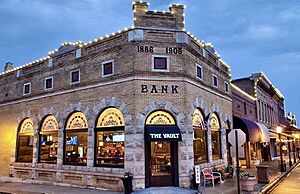Van Buren, Arkansas facts for kids
Quick facts for kids
Van Buren, Arkansas
|
||
|---|---|---|
| City of Van Buren | ||
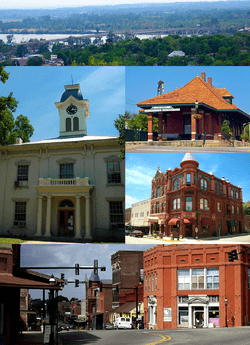
Clockwise, from top: US 64/US 71B bridge over the Arkansas River, Van Buren Old Frisco Depot, Crawford County Bank Building, Main Street in the Van Buren Historic District, Crawford County Courthouse
|
||
|
||
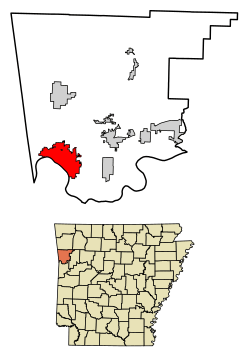
Location of Van Buren in Crawford County, Arkansas
|
||
| Country | United States | |
| State | Arkansas | |
| County | Crawford | |
| Township(s) | Dora, Van Buren | |
| Incorporated | January 4, 1845 | |
| Named for | Martin Van Buren | |
| Government | ||
| • Type | Mayor–Council | |
| Area | ||
| • City | 16.10 sq mi (41.70 km2) | |
| • Land | 15.42 sq mi (39.94 km2) | |
| • Water | 0.68 sq mi (1.76 km2) | |
| Elevation | 650 ft (200 m) | |
| Population
(2020)
|
||
| • City | 23,218 | |
| • Density | 1,505.61/sq mi (581.34/km2) | |
| • Metro | 227,213 (Fort Smith metropolitan area) | |
| Time zone | UTC−6 (CST) | |
| • Summer (DST) | UTC−5 (CDT) | |
| ZIP code(s) |
72956
|
|
| Area code(s) | 479 | |
| FIPS code | 05-71480 | |
| GNIS feature ID | 2405637 | |
| Major airport | FSM | |
Van Buren is a city in Crawford County, Arkansas, United States. It is the second-largest city in the Fort Smith, Arkansas–Oklahoma Metropolitan Statistical Area. Van Buren is located just northeast of Fort Smith, where Interstate 40 and Interstate 540 meet.
The city was officially formed in 1845. In 2020, its population was 23,218, making it the 21st largest city in Arkansas. By 2023, the population grew to an estimated 24,138. This growth makes Van Buren one of Arkansas's fastest-growing cities.
Contents
History of Van Buren
Early Beginnings
The area where Van Buren now stands was first settled in 1818 by David Boyd and Thomas Martin. After Arkansas became a territory in 1819, Daniel and Thomas Phillips built a lumber yard here. This yard supplied fuel for boats traveling on the Arkansas River.
In 1831, a post office was built. The community was then known as Phillips Landing. The post office was named after Martin Van Buren, who was the Secretary of State and later became a U.S. President.
John Drennen and David Thompson bought the land for $11,000. They moved their business of supplying steamboats with firewood to this higher ground. Drennen also gave land for the courthouse. He did this on the condition that Van Buren would become the county seat. The Drennen Reserve is one of the oldest historical sites in the town, dating back to the 1830s.
Van Buren officially became a city on January 4, 1845. The Walker Institute, a school, was started near Van Buren in 1857.
American Civil War Battle
On December 28, 1862, soldiers from the Union and Confederate armies fought in and around Van Buren. The Confederate forces, led by Major General T. C. Hindman, were defeated. They were pushed south across the river with very few losses for the Union side. Union forces captured 100 Confederate soldiers during this battle.
Recent Events
The 2019 Flood
In late May and early June 2019, the Arkansas River flooded near Van Buren. The water level reached almost 41 feet, which was 21 feet above the normal flood level. Heavy rains in the southern United States caused the U.S. Army Corps of Engineers to release a lot of water from upstream dams. This helped prevent worse flooding.
The river stayed high for several days. The flooding damaged 25 homes in the Crawford County area. One levee in Crawford County was damaged, but no levees in Van Buren broke.
The 1996 Tornado
On April 21, 1996, at 11:12 p.m., a strong F3 tornado hit the Fort Smith and Van Buren areas. It caused a lot of damage. The tornado started in Oklahoma and moved into west Fort Smith. It then crossed the Arkansas River into Van Buren.
This tornado caused two deaths, injured 89 people, and led to $300 million in damage. The two people who died were young children from Fort Smith. At its widest, the tornado was half a mile across. It traveled about 7 miles on the ground. Around 1,800 homes were damaged, most of them in Van Buren.
Geography and Climate
Where Van Buren Is Located
Van Buren is in the southwest part of Crawford County. The border between Arkansas and Oklahoma is only about 2 miles to the west. The Arkansas River forms the southern edge of the city, separating it from Fort Smith. Lee Creek flows through the western side of the city and into the Arkansas River.
Van Buren covers a total area of about 16.10 square miles. Most of this (15.42 square miles) is land, and a small part (0.68 square miles) is water.
Van Buren's Weather
Van Buren has a humid subtropical climate. This means it has hot, humid summers and mild winters. The city is also on the eastern edge of a region known as Tornado Alley.
Average temperatures range from about 36°F in January to 81°F in July. In August, temperatures can reach the high 90s and even over 100°F. The average yearly temperature is around 60°F.
Van Buren gets about 41 inches of rain each year. Only about six inches of this is snow. July and August are the hottest months. The highest temperature ever recorded in Van Buren was 113°F in 1936. The lowest was -15°F in 1899.
| Climate data for Van Buren, Arkansas | |||||||||||||
|---|---|---|---|---|---|---|---|---|---|---|---|---|---|
| Month | Jan | Feb | Mar | Apr | May | Jun | Jul | Aug | Sep | Oct | Nov | Dec | Year |
| Record high °F (°C) | 81 (27) |
87 (31) |
94 (34) |
96 (36) |
99 (37) |
106 (41) |
111 (44) |
113 (45) |
109 (43) |
96 (36) |
86 (30) |
82 (28) |
113 (45) |
| Mean daily maximum °F (°C) | 50 (10) |
56 (13) |
65 (18) |
74 (23) |
81 (27) |
88 (31) |
93 (34) |
93 (34) |
85 (29) |
75 (24) |
63 (17) |
51 (11) |
72.7 (22.6) |
| Mean daily minimum °F (°C) | 29 (−2) |
33 (1) |
41 (5) |
50 (10) |
59 (15) |
68 (20) |
72 (22) |
71 (22) |
62 (17) |
51 (11) |
40 (4) |
31 (−1) |
50.4 (10.2) |
| Record low °F (°C) | −11 (−24) |
−15 (−26) |
7 (−14) |
22 (−6) |
34 (1) |
47 (8) |
50 (10) |
45 (7) |
33 (1) |
22 (−6) |
8 (−13) |
−5 (−21) |
−15 (−26) |
| Average precipitation inches (mm) | 2.81 (71) |
2.86 (73) |
3.85 (98) |
4.30 (109) |
5.47 (139) |
4.28 (109) |
3.30 (84) |
2.59 (66) |
4.05 (103) |
4.32 (110) |
4.44 (113) |
3.29 (84) |
45.40 (1,153) |
| Average snowfall inches (cm) | 1.8 (4.6) |
1.3 (3.3) |
0.7 (1.8) |
0 (0) |
0 (0) |
0 (0) |
0 (0) |
0 (0) |
0 (0) |
0 (0) |
0 (0) |
0.7 (1.8) |
4.6 (12) |
| Average precipitation days (≥ 0.01 in) | 7.5 | 7.8 | 9.7 | 9.1 | 10.7 | 9.3 | 6.5 | 6.3 | 7.7 | 8.4 | 7.5 | 7.7 | 98.3 |
| Average snowy days (≥ 0.1 in) | 1.0 | 0.8 | 0.4 | 0 | 0 | 0 | 0 | 0 | 0 | 0 | 0.1 | 0.6 | 2.9 |
| Source 1: NOAA | |||||||||||||
| Source 2: The Weather Channel | |||||||||||||
Population of Van Buren
| Historical population | |||
|---|---|---|---|
| Census | Pop. | %± | |
| 1850 | 549 | — | |
| 1860 | 979 | 78.3% | |
| 1870 | 985 | 0.6% | |
| 1880 | 1,029 | 4.5% | |
| 1890 | 2,291 | 122.6% | |
| 1900 | 2,573 | 12.3% | |
| 1910 | 3,878 | 50.7% | |
| 1920 | 5,224 | 34.7% | |
| 1930 | 5,182 | −0.8% | |
| 1940 | 5,422 | 4.6% | |
| 1950 | 6,413 | 18.3% | |
| 1960 | 6,787 | 5.8% | |
| 1970 | 8,373 | 23.4% | |
| 1980 | 12,020 | 43.6% | |
| 1990 | 14,979 | 24.6% | |
| 2000 | 18,986 | 26.8% | |
| 2010 | 22,791 | 20.0% | |
| 2020 | 23,218 | 1.9% | |
| U.S. Decennial Census | |||
As of the 2020 United States census, Van Buren had 23,218 people. There were 8,990 households and 6,011 families living in the city.
Economy and Infrastructure
Van Buren is home to many large companies. These companies employ many people in the city's Port and Industrial Park district. Key industries in Van Buren include manufacturing, food processing, and medicine.
Some of the main employers are Simmons Foods, which processes poultry, the Van Buren School District, USA Truck, and Baptist Health.
Culture and Arts
Arts and Buildings
Van Buren is known for the King Opera House. This is a beautiful Victorian-style building from the late 1800s. It is part of the old downtown historic area.
At the south end of the historic downtown is the Crawford County courthouse. This is the oldest courthouse still in use west of the Mississippi River. To the north is the Old Frisco Station. This building was once a train station for the St. Louis-San Francisco Railway.
Local Media
Van Buren is part of the Fort Smith metropolitan area. This means that many TV stations from Fort Smith, like KHBS and KFSM, provide local news and weather. KFSM's radio tower is actually in Van Buren.
The main local newspaper is the Van Buren Press Argus-Courier. Many people also read Fort Smith's Southwest Times Record and the Northwest Edition of the Arkansas Democrat-Gazette.
Transportation
Van Buren's location is great for tourism and hospitality. It is where Interstate 40, Interstate 540, and the Arkansas/Oklahoma border meet. The city also has several state and U.S. highways, including Arkansas Highway 59, US 64, and US 71.
There used to be a private airport called Twin Cities Airport southeast of the city, but it has been closed for many years. Today, railroads like the Arkansas and Missouri Railroad and the Union Pacific Railroad run through the city. You can also get intercity bus service from Jefferson Lines.
Education
The Van Buren School District is the biggest school district in Crawford County. It includes:
- Six elementary schools (for grades K-5)
- Two middle schools (for grades 6–8)
- One ninth grade academy (for grade 9)
- One high school (for grades 10–12)
The Van Buren High School competes in the 5A/6A-West Division for Arkansas high school sports.
Places to Visit
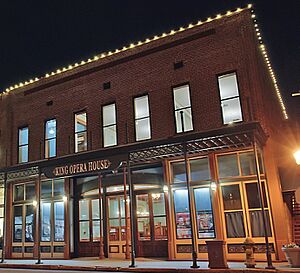
- Historic Main Street: This street has been used in movies like The Blue and the Gray and Frank & Jesse.
- King Opera House: A historic performance hall.
- The Old Frisco Station: A Victorian-style railroad station. It was featured in a scene from the movie Biloxi Blues. It was part of the old St. Louis–San Francisco Railway.
Famous People from Van Buren
- Cyrus Adler: A Jewish religious leader and scholar.
- Bob Burns: A comedian and actor.
- Ryan Rose: A Republican member of the Arkansas House of Representatives from Van Buren.
- Gary Deffenbaugh: A Republican member of the Arkansas House of Representatives from Van Buren.
- John Deweese: A U.S. representative from North Carolina.
- Charlene Fite: A Republican member of the Arkansas House of Representatives from Van Buren.
- Matt Jones: A former NFL player.
- Shay Mooney: A singer and songwriter from the music duo Dan + Shay.
See also
 In Spanish: Van Buren (Arkansas) para niños
In Spanish: Van Buren (Arkansas) para niños
 | Charles R. Drew |
 | Benjamin Banneker |
 | Jane C. Wright |
 | Roger Arliner Young |


